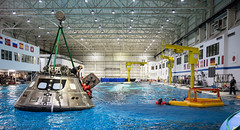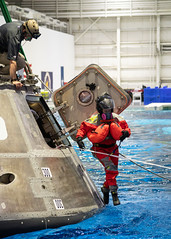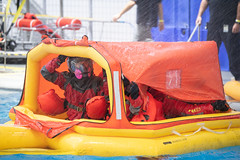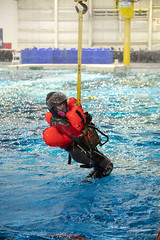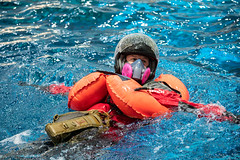Water egress
mercredi 7 octobre 2020 à 16:36Thomas Pesquet posted a photo:
Une grosse différence entre Soyuz et le Crew Dragon, c'est que ce dernier se pose... sur l'eau. L'avantage, c'est que c'est plus facile de viser (70% de la planète couverte par les océans... et pas de relief à éviter). L'inconvénient, c'est que ça demande un peu plus de matériel pour survivre en cas d'amerissage d'urgence : radeau, bouées, matériel de signalisation, fumigènes, radios...). Le bassin d'entraînement en scaphandre se transforme pour l'occasion en mer déchaînée (ou presque), il manque quelques vagues, et tous les moyens aéroportés qui seront déployés à notre recherche, le jour J.
Water survival training with the crew. A large difference between the SpaceX Dragon and the Roscosmos Soyuz is that the Dragon is designed to 'land' on water, and the Soyuz to land... on land. SpaceX chooses the splashdown method which is slightly softer, but more importantly there is more area in the Atlantic Ocean to splash down safely than there is wide open flat uninhabited swathes of land in USA. When we return to Earth from space it is hard to pinpoint exactly where we will land, support crew is generally quickly on site, but we need to be able to survive on our own in case of any delays. The colourful masks are not necessary for the survival training in normal times, but are actually waterproof COVID protection masks!
Date: 09-28-2020
Location: NBL, Pool Topside
Subject:Expedition 65SpaceX Crew-2 astronauts Shane Kimbrough, Thomas Pesquet (ESA), Akihiko Hoshide (JAXA) and Megan McArthur Behnken during USCV Water Survival Training at the NBL.
Photographer: James Blair
jsc2020e042424
